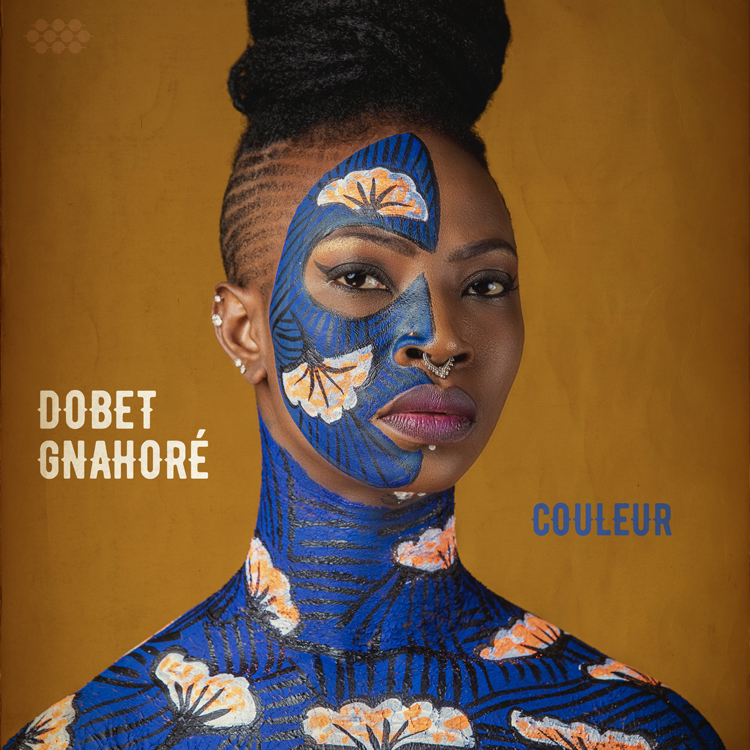The global pandemic (which is what I most often hear it called) has, at the least, changed the plans of many and at the most done much worse. Those who have died, those who knew them, those most susceptible, those struggling to make a living and those working round the clock to eradicate covid are of course among the hardest hit. On the global music scene, altered plans and indomitable spirits have led to the creation of sounds that bespeak perseverance, hope and the fact that humankind does indeed have a future, with music continuing to play a substantial role in it.
The Ivory Coast’s Dobet Gnahore, who had been based in Paris, returned to her homeland to wait out the pandemic on familiar ground and record her new album Couleur (Cumbancha, 2021). A notable departure from the heavily acoustic, neo-traditional style of her earlier work, Couleur is mostly upbeat modern Afropop. Not to worry, though. Intact is Gnahore’s wonderfully emotive and elastic voice, and she shows herself well able, even when the beats sound more programmed and the finished product more studio shiny than usual, to convey the ups and downs of these songs of empowerment, family love, African roots and doing one’s best in the face of adversity. Whether singing in French, indigenous West African languages, English or onomatopoeia, Gnahore wraps her pipes snugly around the grooves and appeals equally to your soul and dancing feet. It’s a different vibe for one of Africa’s finest musical women, but a very good one nonetheless.

Catalan vocalist and clarinetist Carola Ortiz was set to tour Australia before things got ugly. So the down under crowd will, for now, have to be like the rest of us and simply enjoy Ortiz’ latest, Pecata Beata (Segell Microscopi, 2021). Her voice and reed playing are both intricately rich, and the wide-ranging disc touches grandly on flamenco, fado, Ladino, pan-Mediterranean sounds and jazz.
The song lyrics are courtesy of a number of female Catalan poets (contemporary and past), and though Ortiz salutes the region by singing entirely in Catalan as well, no translation is needed to feel the encouraging beauty of these fine pieces.

Given the vast number of guest artists involved, it seems a bit odd to refer to Refuge (MCK, 2020) as an album by Toronto-based Sultans of String. And when I say guest artists, I’m talking the likes of banjo master Bela Fleck, veteran conguero Sammy Figueroa and Israeli songbird Yasmin Levy. Still, credit where it’s due, and SOS has masterminded a very impressive musical tribute to refugees across the globe, honoring their successes and struggles with a collection of songs that come as close to defining “world” music as you can get. Africa, the Middle East, India, Latin America, indigenous America, Iberia, Turkey and the lands of the Celts are just some of the stops on the journey taken by this disc.
Groove-laden excursions with a significant amount of vocals in English slip radically between soaring instrumentals, spoken word testimonies and seamless fusions made for dancing or close listening. An excellent job by all involved, and believe me, I barely scratched the surface when it came to naming names.

For her second album, Barcelonan Lia Sampai continues to collaborate with acoustic guitarist/arranger Adria Pages on Amagatalls de Llum (Segell Microscopi, 2021) while expanding her sound by adding, violin, cello, piano and glockenspiel in a few spots. The feel remains sparse enough for Sampai’s youthful, elegant vocals to spar sweetly with Pages’ equally expressive guitar. Not so much as one word or note is lacking the kind of delicate passion needed to make Spanish music of this caliber work, and it all works perfectly.

Founded by Boston-based Mina Cho, a Korean pianist/composer of exceptional skill and vision, The Gugak Jazz Society brings an unexpected but successful fusion to life on Greekorea: Greeting the Moon (IGJI/SNMC, 2021). The project was initially slated to be a live performance, but our old friend covid intervened and turned it into an album recorded in the U.S., Korea and Greece.
Anyone figuring the disc to be a mere blending of Greek and Korean sounds will be pleased to find that the word “jazz” in the name of the ensemble also figures heavily into the finished product. Sure, the tones of the gayageum (Korean zither) and laouto (Greek lute) would mix well no matter what, as would the combination of Korean and Middle Eastern percussion that adds zest to the bedrock drum kit. But the lengthy tracks, based on mutual traditions, are loaded with the kind of tightly rendered twists and turns that characterize jazz experimentation. Factor in Cho’s nimble piano work frequently taking the lead, Korean vocals that rise and fall to match the intensity of the instruments, and a sense of collaboration that gives every aspect its due. The end result is a winning combination indeed.


